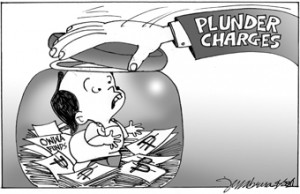
Accusations about the anomalous use of the OWWA fund, which consists of the $25 contributions of departing overseas workers, surfaced again in 2005 and then again in 2006; in the latter year, the Senate even began an inquiry. Arroyo administration officials, invoking the controversial Executive Order 464, declined to attend the hearings.
The Arroyo administration denied any wrongdoing, with forceful explanations coming in particular from Francisco Duque III, then the new health secretary. But the refusal of administration officials to take part in the Senate inquiry and the inexplicable indifference of the anti-corruption agencies at the time suggest that a true reckoning has not yet been done.
That is why the filing of the charges before the Department of Justice the other day should be welcomed. Here, finally, is an opportunity for the officials concerned (aside from Arroyo and Duque, who at the time of the alleged diversions was the president of the Philippine Health Insurance Corp., Chavez also filed charges against Alberto Romulo, then the executive secretary, and Virgilio Angelo, then the OWWA administrator) to render a strict accounting. We are confident that the Department of Justice under Sec. Leila de Lima will attend to the case with both dispatch and fairness.
To be sure, Chavez’s incorrigible use of cliche—already dated in the 1980s, when he served as solicitor general; just plain cheesy, as younger Filipinos would put it, today—does not exactly inspire confidence. “Today is one of those days of reckoning,” he said after filing the complaint. “Some people think that they can run but they cannot hide. The long arm of the law will catch up with them in the fullness of time.” This mix of old-fashioned cinematic bravado (“they can run but they cannot hide”) and Biblical rhetoric (“the fullness of time”) is so obviously meant for the cameras, so obviously a bit of hamming up, that it does not even work as sound bite. It does not persuade.
Chavez, too, undermines his own sources (whom he described as “kind-hearted, highly conscienticized Filipinos”) by not thinking his language through; he says they tipped him off because they “could no longer stomach the quagmire of corruption spewed by Malacañang.” The metaphors are so mixed as to inadvertently paint his sources in a ridiculous light; does he even know what quagmire means?
Better to focus on the evidence—and on the damning inaction of Ombudsman Merceditas Gutierrez in the last few years. Indeed, Chavez purposely avoided filing the case with Gutierrez’s office, even though “procedural propriety” would call for it, because he said he could not “ignore verities that would effectively render the filing of this Complaint-Affidavit with that office an exercise in futility—and frustration.” (The pleading uses much better English.)
There is a long way to go before a plunder trial can even begin to commence; Gutierrez not having acted despite her motu propio powers, Chavez’s complaint merely prompts the machinery of justice to start moving. The first step is for the DOJ to conduct a preliminary investigation.
What is of vital importance is the meaning of the evidence Chavez has presented: Arroyo administration memoranda that purportedly document first the diversion of OWWA money and second the use of that same OWWA money to ensure Arroyo’s election. Chavez, in particular, presented at least two Palace documents bearing then-President Arroyo’s marginal note to charge the proposed expenditure to OWWA, and a certain-to-be-controversial memorandum from Duque, then of PhilHealth, to Arroyo, specifically discussing “the far-reaching political implications” of transferring OWWA Medicare funds to Philhealth.
The DoJ has its work cut out for it.